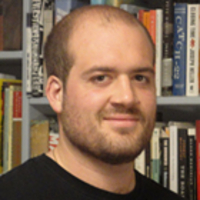In The Light of What We Know: A novel
By Zia Haider Rahman

Within the first two chapters of Bangladeshi-British writer Zia Haider Rahman’s impressive first novel, In the Light of What We Know, he has named-checked Melville, Conrad, Edward Said, and Kurt Godel, among others, and included a multi-page footnote on the political implications of the dominant projection of the world map. It is immediately apparent that one is dealing with a work of major ambition. The frame of the story, though, is a familiar one—an old friend reappears on the doorstep with a story to tell. The owner of the doorstep is a middle-aged financier whose life has begun to fray at the edges, and the old friend is a mysterious mathematical prodigy named Zafar, who had disappeared years earlier, soon after 9/11. While Zafar relates the continent-spanning tale of where he’s been and what he’s done, Rahman unpacks enough interesting digressions—on philosophical mathematics, on the structure of international NGOs, on the metamorphosis of salamanders—to fill about a Wikipedia and a half. But sheer weight of information (or “cognitive load,” as the narrative addresses as a plot point) does not a compelling novel make; the main reason to get excited over Rahman’s emerging presence as a writer are his sentences, ramifying and unraveling to bring in more and more ideas between full-stops in a way that few still alive can command. Here the narrator speaks of Zafar: “While I am keen to preserve the sense of his design and purpose, I cannot but wonder if Zafar’s own ordering of his exposition, which began so very far back, with a childhood journey, and which left the start of the story of Afghanistan to much later, might actually have been driven by a wish—a wish unseen, as he might have said—a wish to delay broaching the matter of Kabul and all that came with it.” What kind of reader wouldn’t read on?
Strange Glory: A Life of Dietrich Bonhoeffer
By Charles Marsh

That the life of German theologian and writer Dietrich Bonhoeffer continues to interest both academic and casual audiences decades after his death is surely due largely to how it ended: hanged by a crumbling Nazi regime, just days before the death of Hitler, for treason. (What more noble or inspirational a crime can be committed than treason against history’s most evil empire?) But this excellent new biography by a professor of religious studies at the University of Virginia does a service toward the Christian martyr’s entire life—from the blossoming of his religious fervor as a child (his family had no particular piety), to the fostering of his theological brilliance and growth as an international figure, to the subversive activities that would lead to his imprisonment in a concentration camp and eventual drumhead trial. That his story is a doomed one, though, is drawn out elegantly from the very first page: “Sometimes he would picture himself on his deathbed, surrounded by family and friends, reclining on the threshold of heaven. He knew what his last words would be and sometimes rehearsed them aloud, although he dared not reveal them to anyone.” This is a study in the power of faith and conviction, with a healthy serving of spiritual redemption as well.
Exit Berlin: How One Woman Saved Her Family From Nazi Germany
By Charlotte R. Bonelli

To look at an old photograph of a person in a previous era is so often captivating because it invites the observer to contemplate all that the subject of the photograph didn’t know about the state of the world, or what was in store for them. To read their letters is a similar exercise, even when the correspondence regards only quotidian matters. Imagine then what it must have felt like for Charlotte R. Bonelli, director of the Archives of the American Jewish Committee, to discover the bundled correspondence of Luzie Hatch, an unassuming German-born Jew who had fled Germany just days after Kristallnacht for refuge in New York, rescued by her American-born businessman cousin, Arnold Hatch. As the situation in Europe deteriorated, Arnold began to receive more and more requests for help from Jewish relatives, which Luzie translated, as he spoke no German, and helped to draft responses. Presented here with rich contextual information by Bonelli, the reader watches Hatchs’ growing realization about the menace of the Holocaust, and their own limited capacity to fight against it as it unspools with growing, implacable horror. This book reminds us that only very recently the world was a much larger place, and that the fate of many thousands hung on the ability to get to a port by a certain date, to possess a certain piece of documentation, or on a certain letter arriving in the mail. “Please understand that we only want to save two relatives from certain destruction,” writes Luzie in one letter. Perhaps no amount of imagination can help a reader get into the mind of someone who was forced to pick up a pen to commit those words to paper, but this book is a good start.






